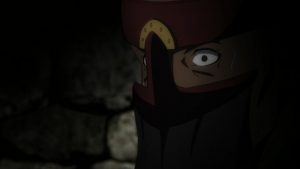 Mugen no Juunin: Immortal is a series of contrasts to be sure. Ever since it left its episodic phase (which I think was probably the anime at its best) in favor of major plot arcs, it’s never not been obvious that this foot is way too big for the shoe it’s being crammed into. There are too many characters and there’s too much plot, forcing events to be cut short before they can be properly exposited (or digested). Characters come and go without proper introduction or development, reducing all but a few to plot drivers and leaving genuine confusion as to who some even are.
Mugen no Juunin: Immortal is a series of contrasts to be sure. Ever since it left its episodic phase (which I think was probably the anime at its best) in favor of major plot arcs, it’s never not been obvious that this foot is way too big for the shoe it’s being crammed into. There are too many characters and there’s too much plot, forcing events to be cut short before they can be properly exposited (or digested). Characters come and go without proper introduction or development, reducing all but a few to plot drivers and leaving genuine confusion as to who some even are.
 And yet – and I chalk this up entirely to the genius of Hamasaki Hiroshi – Immortal retains an elegance and grace that few series can match. Somehow even when it’s frenetically paced it can feel reflective and somber, and that all comes down to the way Hamasaki presents the material. That’s been consistently true throughout the entire run apart from the Burando arc, which I think it’s best to just write off as an aberration and a total misfire. Last week’s conclusion of that arc was a step in the right direction, but this was the first time since before it started that Immortal has really resembled its finest self.
And yet – and I chalk this up entirely to the genius of Hamasaki Hiroshi – Immortal retains an elegance and grace that few series can match. Somehow even when it’s frenetically paced it can feel reflective and somber, and that all comes down to the way Hamasaki presents the material. That’s been consistently true throughout the entire run apart from the Burando arc, which I think it’s best to just write off as an aberration and a total misfire. Last week’s conclusion of that arc was a step in the right direction, but this was the first time since before it started that Immortal has really resembled its finest self.
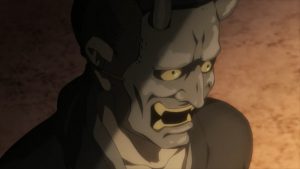 An even modestly attentive viewing of this series reveals that author Samura Hiroaki has a favorite pattern – he introduces characters as villains, then exposes enough of the story to make us call that into question. It started with Manji himself it could be argued, and certainly Magatsu, and it’s repeated itself many times. I’m not sure I can apply it to Habaki, because he’s such a right bastard that I’m not sure there’s anything he could do that would make him sympathetic as a character. But either way characters are always more interesting when we see all facets of them and their experience, and this episode certainly took Habaki to a new place.
An even modestly attentive viewing of this series reveals that author Samura Hiroaki has a favorite pattern – he introduces characters as villains, then exposes enough of the story to make us call that into question. It started with Manji himself it could be argued, and certainly Magatsu, and it’s repeated itself many times. I’m not sure I can apply it to Habaki, because he’s such a right bastard that I’m not sure there’s anything he could do that would make him sympathetic as a character. But either way characters are always more interesting when we see all facets of them and their experience, and this episode certainly took Habaki to a new place.
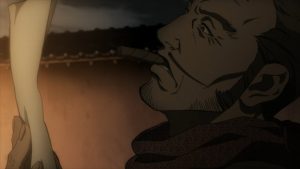 That place is a pretty lousy one. Having been scapegoated for the Fukiage debacle, he’s been given a mandate to commit seppuku – but in 30 days, during which time he can salvage his honor if not his life by destroying the Ittou-ryuu once and for all. A new man has been put in charge, Ugen Hanabusa (Futamata Issei), and he promptly takes Habaki’s wife and son as hostages to ensure his disgraced predecessor’s obedience. This infuriates his illegitimate daughter Ryo (Tanaka Yuki), who flies to their aid, but Habaki’s wife puts a stop to the melee and agrees to be caged.
That place is a pretty lousy one. Having been scapegoated for the Fukiage debacle, he’s been given a mandate to commit seppuku – but in 30 days, during which time he can salvage his honor if not his life by destroying the Ittou-ryuu once and for all. A new man has been put in charge, Ugen Hanabusa (Futamata Issei), and he promptly takes Habaki’s wife and son as hostages to ensure his disgraced predecessor’s obedience. This infuriates his illegitimate daughter Ryo (Tanaka Yuki), who flies to their aid, but Habaki’s wife puts a stop to the melee and agrees to be caged.
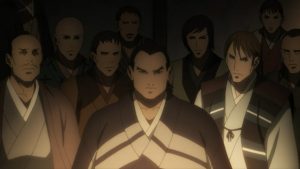 This all happens with blazing speed (of course) but it’s almost possible to piece together a rough idea of what’s happening here. Habaki puts together a new outfit of condemned criminals (as he is himself now, effectively) calling it the “Rokki”, to hunt down the Ittou-ryuu. For their part they’ve clearly decided it’s time to make their move, and Kagehisa’s stated intention to follow Ugen’s order to leave Edo is obviously a ruse. They lay a trap for the Rokki in the ruins of their burned-out dojo and take out most of the zaku, but Habaki and Ryo (who comes out second-best in a duel with Magatsu) survive.
This all happens with blazing speed (of course) but it’s almost possible to piece together a rough idea of what’s happening here. Habaki puts together a new outfit of condemned criminals (as he is himself now, effectively) calling it the “Rokki”, to hunt down the Ittou-ryuu. For their part they’ve clearly decided it’s time to make their move, and Kagehisa’s stated intention to follow Ugen’s order to leave Edo is obviously a ruse. They lay a trap for the Rokki in the ruins of their burned-out dojo and take out most of the zaku, but Habaki and Ryo (who comes out second-best in a duel with Magatsu) survive.
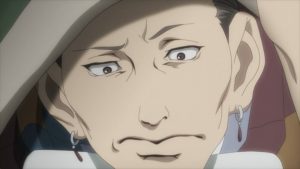 The most powerful scene of the episode, to be sure, is Habaki’s wife taking her own life and that of her son in order not to shackle her husband’s hands as he tries to salvage his honor. To our eyes this all seems pretty pointless, and I don’t think unreasonably so – he’s condemned either way, and their son had his whole life ahead of him. But that’s Bushido for you – honor is everything, and the needs of the family are indeed “trivial” as Habaki called the matter of their being taken hostage.
The most powerful scene of the episode, to be sure, is Habaki’s wife taking her own life and that of her son in order not to shackle her husband’s hands as he tries to salvage his honor. To our eyes this all seems pretty pointless, and I don’t think unreasonably so – he’s condemned either way, and their son had his whole life ahead of him. But that’s Bushido for you – honor is everything, and the needs of the family are indeed “trivial” as Habaki called the matter of their being taken hostage.
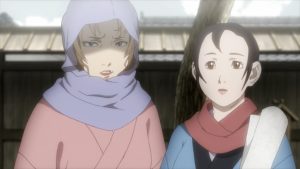 Where is this all headed? Well, Habaki says he’s going to kill himself when his 30 days are up regardless of whether he succeeds or not, and I have no reason to doubt him. Ugen seems like a small man, not someone who will matter in the long term. So I think the question of real interest here is what side Rin and Manji will come down on when everything really hits the fan. The whole revenge theme seems to have largely been tabled – Rin has actual friends in the Ittou-ryuu now and even Kagehisa is now a human being in her eyes, and Manji himself has no beef with them apart from the one Rin hired him to execute. So I don’t really know what Samura-sensei’s endgame is with this story, but it certainly should be interesting to find out.
Where is this all headed? Well, Habaki says he’s going to kill himself when his 30 days are up regardless of whether he succeeds or not, and I have no reason to doubt him. Ugen seems like a small man, not someone who will matter in the long term. So I think the question of real interest here is what side Rin and Manji will come down on when everything really hits the fan. The whole revenge theme seems to have largely been tabled – Rin has actual friends in the Ittou-ryuu now and even Kagehisa is now a human being in her eyes, and Manji himself has no beef with them apart from the one Rin hired him to execute. So I don’t really know what Samura-sensei’s endgame is with this story, but it certainly should be interesting to find out.


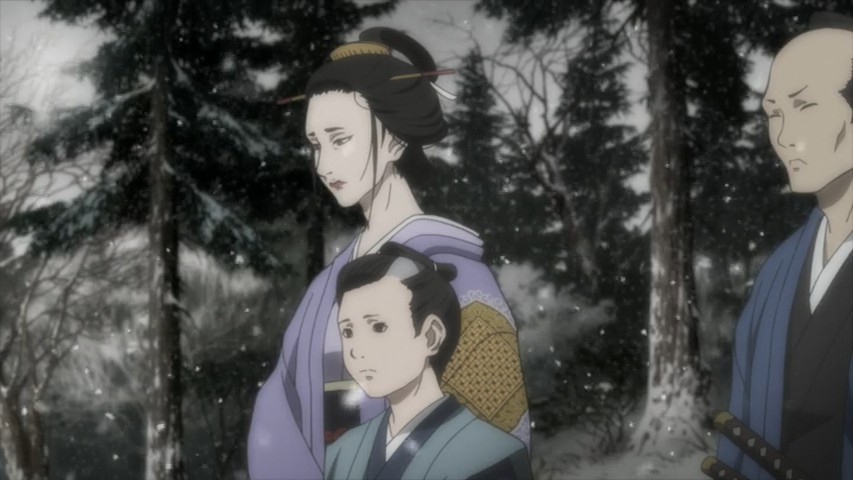

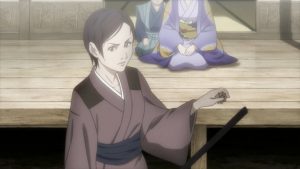
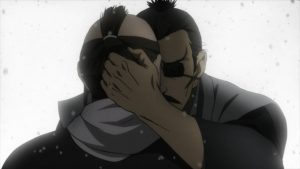
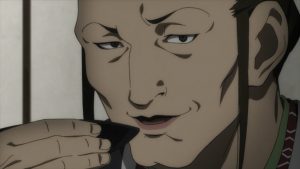
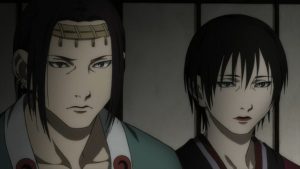
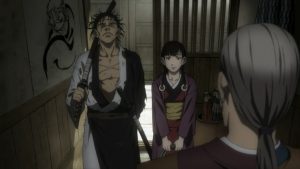
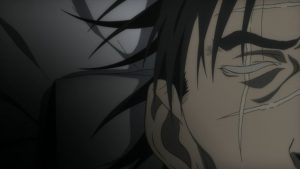
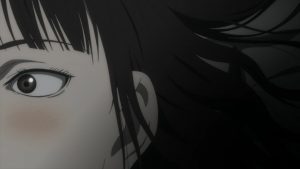
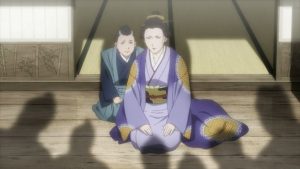
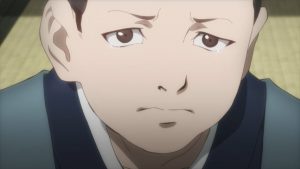
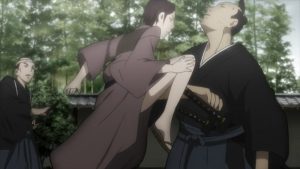
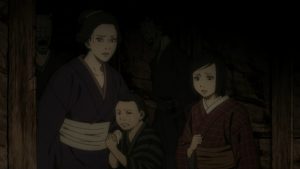
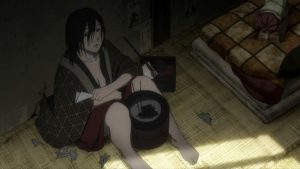
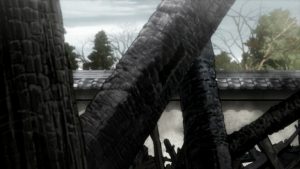
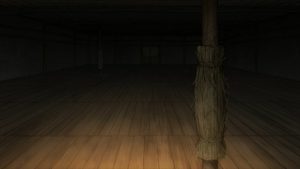
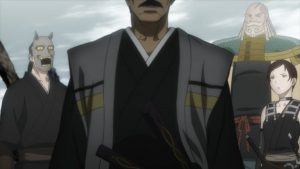

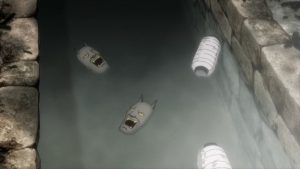
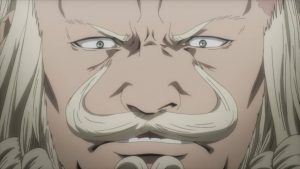
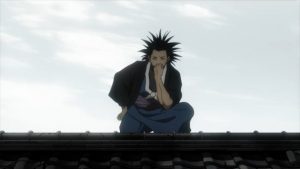
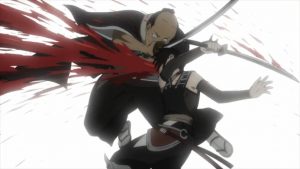
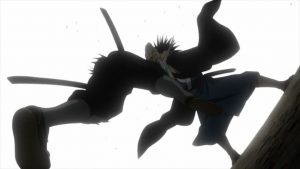
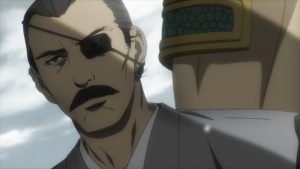
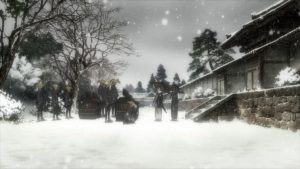
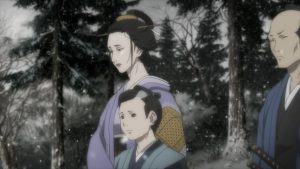
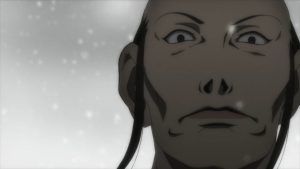
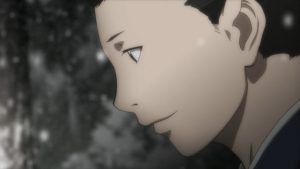
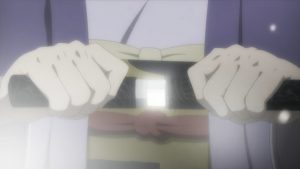
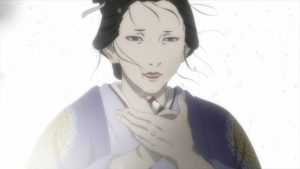
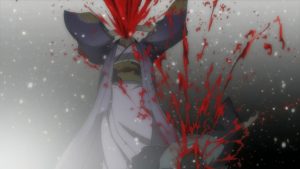
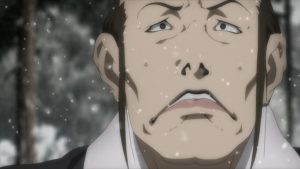
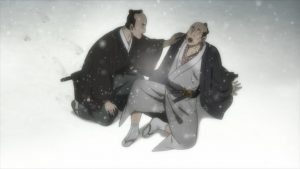

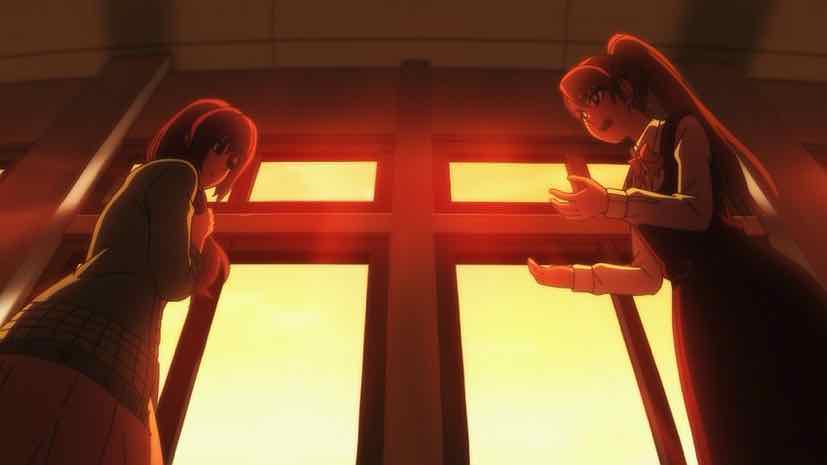

red
February 6, 2020 at 9:17 pmThis was a breath of fresh air from those dreary, underground episodes. You’ve got to give it to director Hamasaki managing this episode despite being an introduction to a new arc with the usual cramming of chapters. Also, the characterization of Habaki’s wife was pretty good despite only appearing for a few minutes.
Guardian Enzo
February 6, 2020 at 9:42 pmHe certainly is making a silk purse from a sow’s ear, to be sure.
Panino Manino
February 6, 2020 at 10:06 pmSPREAD THE GOOD NEWS!
Mugen no Juunin is good again!
(The title was “banshee’s cries”, now that “music” made sense)
See minna-san?
They return (mostly) to that stand alone format and the episode suddenly works wonders. And this episode was better looking because it was less claustrophobic. There was also scenes where you could see a bit of the location and the character’s bodies.
But the best part was that this episode remembered that this history is much about the cycle of revenge and forgiveness. And it’s just adequate that this episode was a small skirmish between that status quo that feeds this cycle and the forces rebelling against it.
Also, notice the symmetry with the torches (the fire that consumes while it’s talking about shedding blood) and the masks (the demons that it unleashes).
It’s Certified Kino™.
Done without a need of budget, only care from the team.
Thinking about the way the episode ended, I can barely contain my enthusiasm in waiting to see that chance meeting over sake…
(do justice to that scene, please)